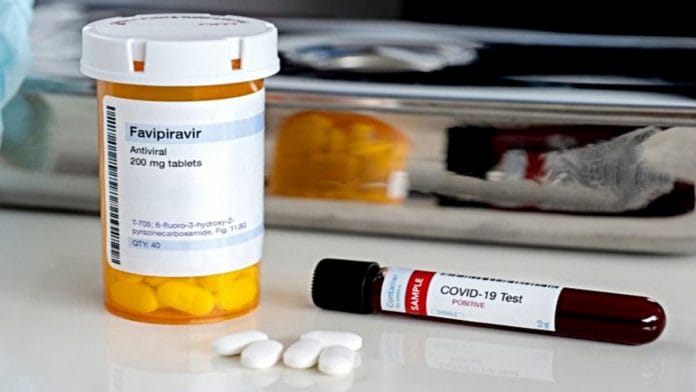New Delhi: Patients who were given favipiravir — one of the most sought-after drugs now for Covid-19 treatment — seemed to have recovered faster, claimed Mumbai-based drugmaker Glenmark Wednesday while announcing the results of the phase 3 clinical trials of the drug.
The company had conducted the trials on 150 mild to moderate Covid-19 patients across seven clinical sites in the country to evaluate the efficacy and safety of the Japanese drug used to treat flu.
Favipiravir is also being studied in multiple ongoing international clinical trials. The drug selectively inhibits RNA-dependent RNA polymerase (RdRp) and the viral replication phase of SARS-CoV-2.
Out of the total 150 patients — 90 patients had mild and the remaining had moderate symptoms. Typically, a phase 3 trial should enroll more than just 150 patients.
In a statement, the company claimed “40 per cent faster achievement of clinical cure” in the patients, which is defined as the physician’s assessment of normalisation of clinical signs — temperature, oxygen saturation, respiratory rate and cough.
It further claimed “a statistically significant reduction in median time to clinical cure in the Favipiravir treatment arm” in three days compared to the control arm (those who were not given the drug and was only under standard supportive care) of five days.
Standard supportive care was given in accordance with the Indian Council of Medical Research (ICMR) norms.
In April, the company announced that it has received an approval from the Drug Controller General of India to conduct clinical trials of the antiviral medicine.
The findings shared by the company have not been independently reviewed yet and the data is also not public.
“Glenmark plans to submit the clinical trial data for publication in a peer-reviewed journal in the coming weeks and share our findings,” the company said.
Also read: Glenmark’s favipiravir under govt scanner for ‘false claims’, cost, DCGI seeks clarification
Results from the trial
Patients in the clinical trial received 3,600 mg favipiravir tablets on Day One and 1,600 mg on Day Two and later, for up to a maximum of 14 days, along with standard supportive care.
“Results from the Phase 3 trial showed numerical improvements for the primary efficacy endpoint with 28.6 per cent faster viral clearance in the overall population… compared to those in the control arm,” the company said.
“69.8 per cent of patients in the Favipiravir treatment arm achieved clinical cure by Day 4, which was statistically significant, compared to 44.9 per cent observed in the control arm.”
The statement added, “Among patients who clinically deteriorated and required oxygen support, those receiving Favipiravir had a longer median time to first time use of oxygen of 5 days versus 2 days in the control arm.”
26 patients suffered from adverse events
Adverse events (AEs) were reported in 26 patients in the favipiravir treatment arm (35.6 per cent) as compared to six patients in the control arm (8 per cent).
However, most AEs were mild to moderate and none led to drug discontinuation or dosing adjustments, the company said.
According to the US Food and Drug Administration (US FDA), “an adverse event is any undesirable experience associated with the use of a medical product in a patient”.
The most commonly observed AE, the company said, “was asymptomatic transient increase in uric acid (12 patients in the Favipiravir treatment arm and zero in the control arm); most resolved on first follow up. Gastrointestinal disturbance was minimal and no clinically significant differences were observed between the treatment groups”.
One serious adverse event (SAE) occurred in the non-favipiravir arm, which resulted in death due to worsening of the disease.
However, overall, the statement said, “Glenmark’s Favipiravir was well tolerated with no serious adverse events (SAEs) or deaths in the Favipiravir treated arm.”
(With inputs from Sandhya Ramesh)
Also read: Favipiravir cheapest in India, false claims hurting reputation — Glenmark tells Modi govt







Drug company producing the drug, conducting trials and telling it works.
Independent trials in japan has shown no significant benifit.
Why is Print publishing this and becoming part of the pharmaceutical mafia?